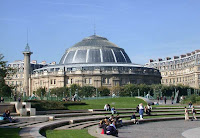
Moreover, the Malian artisans get support from the United Nations Industrial Development Organization (UNIDO) and other donors, Japanese and European. How cool is that?
I met Sidiki Ouattara, national coordinator of the UNIDO pilot project called Tissutèque which was started in the early 1990s jointly by the governments of Mali and Japan -- both aware that West Africa has a rich heritage in artisanal textile, but the dyers were abandoning the trade because it was becoming less and less profitable.


So far, the seed money provided has produced 10 spinning wheels, 500 pairs of handcarders, 100 weaving looms, 20 woolwinders, 20 warping boards, 10 new types of fabrics and training of 100 people. There are also three manually-operated dyeing machines and two electric ones that have been converted to gas power. (Electric power is expensive, but gas is subsidized by the government!) Over the years they have developed 50 repeatable dye recipes using scientific instruments and have trained 300 women in the art of dyeing.






I had a lively chat with Mr. Ouattara in his office while an info tech person was installing his webcam to enhance his Skype use. I talked of Charkhas for Africa and the equipment that is available to spinners in the US.
He was very excited and as soon as the webcam work was done, he asked me to show him the works of American spinners and the equipment shops available online. And then he turned to me and said, "Madam, you coming so late in the game. We could have used your advice when we were starting."
He went on to explain, that though they had financing, they didn't have technical advice. He said that the donors wanted to provide heavy-duty machines, but he said, that wouldn't have worked. "You have to start from the bottom and work your way up to find a sustainable solution. First you have to build the capacity of the people before you give them sophisticated equipment."
As I left, Mr. Ouattara gave me a list of things that he wanted assistance with: a quote for 1000 pieces of carding cloth, a sample of a spinning wheel made of PVC, and information on a small dyeing machine or a large washing machine that is gas-operated. He was concerned that the women who dye the traditional way with just rubber gloves and masks were not adequately protected from the toxic effect of chemicals.
The sample Babe spinning wheel, I'm happy to report, has be sent off to Bamako via DHL. The super-durable carding cloth from Strauch turned out to be out-of-reach despite donor financing; thus, they are going for the cloth that is locally available. I've started the research on the dyeing machines made in China and India. However, I have not seen one that is gas-operated. If you have any suggestions, please email me.
When I returned home, I received this email from Mr. Ouattara. He wrote: Following your visit to Mali, I'm writing to say that I look forward to our partnership in our common passion: the promotion of artisanal textile.
A very nice way, indeed, to end year 2007 and begin a new one.